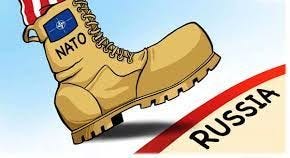A critical view of NATO's post-Cold War expansion, arguing that its true purpose is not to protect democracy but to weaken and dismember Russia. They claim that NATO's eastward expansion, despite promises to the contrary, has served to encircle Russia and limit its influence, fueling resentment and distrust. The sources further allege that the West seeks to exploit Russia's vast natural resources through a combination of economic pressure, cultural manipulation, and strategic provocations, culminating in a fractured and weakened state susceptible to external influence.
The notion that NATO's post-Cold War existence and aggressive expansion serve ulterior motives tied to the dismemberment and economic conquest of Russia has gained traction in certain circles. This theory suggests that, far from being a defensive alliance, NATO is the vanguard of Western hegemony, intent on dismantling the Russian Federation to exploit its immense natural resources and geopolitical position. The collapse of the Soviet Union in 1991 removed the immediate justification for NATO's presence. Yet, not only did the alliance persist, it expanded relentlessly eastward, despite assurances to Moscow that such an expansion would not occur. To some, this reveals a hidden agenda—one that seeks to prevent Russia from integrating into the Western sphere in any meaningful way, instead relegating it to a perpetual adversary, a bogeyman that justifies NATO’s continued existence and growth.
Vladimir Putin's early overtures toward Western integration are often overlooked or dismissed in mainstream narratives, but in the aftermath of the Soviet collapse, he appeared genuinely interested in cooperation with the West. Russia, still reeling from the collapse of its empire, was vulnerable and its leadership sought pathways to stability. There was a brief moment when Russia could have been brought into the fold of European institutions, perhaps even NATO itself. Instead, Putin’s overtures were rebuffed. The West, under the pretext of democracy-building and market reform, allowed Russia to sink into the economic chaos of the 1990s, overseen by oligarchs and Western financial interests.
This refusal to include Russia in the post-Cold War order fed into the idea that NATO’s ultimate objective was not peace but expansion—both of territory and influence. The transformation of former Warsaw Pact countries into NATO members was cast as a natural progression, a safeguard for democracy in Eastern Europe. Yet, from Moscow’s perspective, this expansion encircled Russia, reducing its buffer zones and pushing hostile military forces to its borders. The idea that this is a defensive move, that NATO is merely protecting vulnerable democracies, seems suspect when viewed through the lens of Russian security interests.
More pointedly, critics of NATO argue that its actions are not merely about encirclement, but about conquest by other means. The real prize in the eyes of the West is not Eastern Europe or even the Baltic states—it is Russia itself. Russia’s vast landmass holds an extraordinary wealth of resources: oil, natural gas, precious metals, and rare minerals that are essential for global industries. But these resources, in the hands of a Russia outside the Western system, are inaccessible or at least not as readily exploitable by Western multinational corporations. Therefore, NATO’s continued expansion and provocations along Russia’s borders are seen as part of a larger strategy to destabilize and ultimately dismember the Russian Federation, paving the way for Western corporate interests to exploit its patrimony.
The blueprint for this dismemberment, as posited by critics, is not a direct military conquest but the fostering of internal chaos. One sees parallels between this view of NATO’s aims in Russia and what some perceive as the West’s approach to its own territories. Just as Europe has been flooded with migrants, overwhelming social systems and creating cultural dislocation, so too could Russia be subjected to a similar form of managed chaos. The West, in this theory, would not seek to dominate Russia by force alone but through the creation of internal divisions, fostering separatist movements, and exacerbating ethnic tensions in its vast and diverse territories. By weakening Russia internally, the theory goes, NATO—or more accurately, the Western economic interests behind it—could achieve what centuries of military adventurism failed to do: seize control of Russia's vast resources and landmass under the guise of “liberation” and “democratization.”
Putin’s portrayal in Western media as a revanchist, authoritarian figure who seeks to resurrect the Soviet Union serves this narrative well. By casting Russia’s actions in Ukraine, Georgia, and elsewhere as inherently aggressive, the West sets the stage for further NATO involvement in Eastern Europe and beyond. NATO’s presence, it is argued, becomes not the reaction to Russian aggression, but the provocation that forces Russia to act defensively. In this light, every move by Putin to secure Russia’s borders, every act of resistance against NATO expansion, is reframed as an act of aggression, reinforcing the idea that Russia is a rogue state, a danger to European stability, and therefore in need of containment—if not outright regime change.
In this view, the real endgame for the West is the transformation of Russia into a fractured, weakened state, open to foreign influence and control, much like what some argue has already been done to parts of the Middle East and Eastern Europe. The influx of foreign migrants into Europe, ostensibly a humanitarian response to war and instability, is seen by some critics as a deliberate strategy to dilute national identities and weaken the social fabric, rendering these countries easier to control. If such a strategy is applied to Russia, the results could be catastrophic. Once a bastion of national sovereignty and cultural cohesion, Russia would become another node in a globalized system, its vast resources handed over to multinational corporations while its people are subjected to the same cultural and demographic dislocation seen in parts of Europe today.
This view posits that NATO is not merely a military alliance but the spearhead of a new form of Western imperialism—one that does not rely on traditional colonial methods but instead uses economic influence, cultural manipulation, and strategic provocations to achieve its aims. Russia, as one of the last great nation-states resistant to this form of globalism, stands in the way of this agenda.
NATO and Russia: A Critical Perspective
Study Guide
Quiz
How has NATO's expansion been perceived by Russia?
What alternative path did Russia potentially have after the Soviet collapse, and why was it not taken?
What is the "real prize" according to critics of NATO's expansion, and why?
Explain the theory of "managed chaos" as it relates to Russia.
How does the portrayal of Vladimir Putin in Western media contribute to the narrative of NATO expansion?
What is the perceived endgame for the West regarding Russia's future?
Explain the comparison made between the influx of migrants in Europe and the potential future of Russia.
What is the historical context for the claim that NATO seeks to exploit Russia's resources?
How does the study guide characterize the difference between traditional colonialism and the alleged new form of Western imperialism?
What specific actions or events are cited as evidence of NATO's alleged intentions towards Russia?
Answer Key:
NATO's expansion has been perceived as a direct threat by Russia, encircling its borders and pushing hostile military forces closer. This expansion has eroded Russia's buffer zones and fueled the perception that NATO seeks to contain and weaken Russia.
After the Soviet collapse, Russia, under Putin, initially sought cooperation and integration with the West, potentially even joining NATO. However, this path was not taken as the West rebuffed these overtures, focusing instead on economic reforms that led to instability and allowed Western interests to exploit Russia's economic vulnerability.
The "real prize," according to critics, is Russia itself, particularly its vast natural resources. These resources, crucial for global industries, are seen as inaccessible or less exploitable while Russia remains outside Western control.
The "managed chaos" theory suggests that the West aims to destabilize Russia internally through tactics similar to those allegedly used in Europe, such as the influx of migrants. This manufactured chaos would weaken Russia's social fabric and national identity, making it more susceptible to external control and exploitation.
Portraying Putin as a revanchist and authoritarian figure seeking to revive the Soviet Union reinforces the justification for NATO expansion. This narrative paints Russia as the aggressor, justifying NATO's presence as a defensive measure against a perceived threat to European stability.
The perceived endgame for the West is the transformation of Russia into a fragmented and weakened state, susceptible to foreign influence and control. This would grant Western entities access to Russia's resources and integrate it into the globalized system under Western hegemony.
The comparison highlights the potential for Russia to experience a similar influx of migrants as seen in Europe, allegedly leading to cultural dislocation and the weakening of national identity. This is presented as a deliberate strategy to facilitate external control by eroding internal cohesion.
Historically, Russia has been targeted for its vast resources and strategic location. From Napoleon's invasion to Hitler's eastward expansion, external powers have sought to exploit Russia's wealth and geopolitical significance. This history fuels suspicion regarding Western intentions towards Russia.
Traditional colonialism relied on direct military control and territorial occupation. The new form of Western imperialism, as alleged, operates through economic influence, cultural manipulation, and strategic provocations to achieve control without direct military conquest.
NATO's eastward expansion, Western involvement in Ukraine and Georgia, and the portrayal of Russia as an aggressor are cited as evidence of NATO's alleged intentions to destabilize and control Russia.
Essay Questions:
Evaluate the argument that NATO expansion is a defensive response to Russian aggression. Provide evidence from historical events and geopolitical dynamics to support your analysis.
Analyze the potential economic and political motivations behind NATO's actions towards Russia. Consider the role of natural resources, geopolitical influence, and global power dynamics.
Critically examine the concept of "managed chaos" as a strategy for achieving geopolitical objectives. Discuss its potential applications, effectiveness, and ethical implications.
To what extent is the portrayal of Vladimir Putin in Western media a fair and accurate representation of his leadership and foreign policy objectives? Support your answer with evidence and analysis.
Discuss the potential consequences of Russia's integration or exclusion from the Western-led global order. Consider the implications for international security, economic development, and the future of global power dynamics.
Glossary of Key Terms:
NATO (North Atlantic Treaty Organization): A military alliance formed in 1949 by North American and European countries to provide collective security against the Soviet Union.
Warsaw Pact: A military alliance formed in 1955 by the Soviet Union and its satellite states in Eastern Europe as a response to NATO.
Western Hegemony: The dominance of Western powers, particularly the United States, in global affairs, including economic, political, and cultural influence.
Revanchist: A political ideology or movement that seeks to reclaim lost territory or prestige, often associated with aggressive foreign policy.
Oligarchs: A small group of individuals who control significant economic and political power within a country, often through corrupt means.
Separatist Movements: Groups advocating for the secession of a region from a larger state to form an independent entity.
Managed Chaos: A theory suggesting that powerful actors deliberately create or exploit instability to achieve their geopolitical objectives.
Globalism: The interconnectedness and interdependence of nations through trade, communication, and cultural exchange.
Nation-State: A sovereign political entity with a defined territory, population, and government.
Patrimony: The inherited resources, culture, and traditions of a nation or people.














Share this post